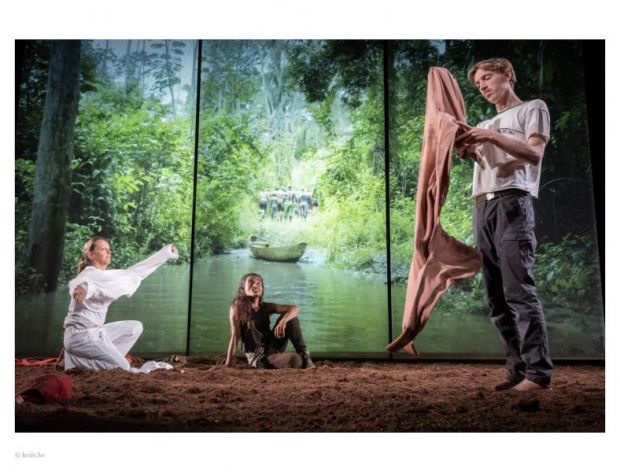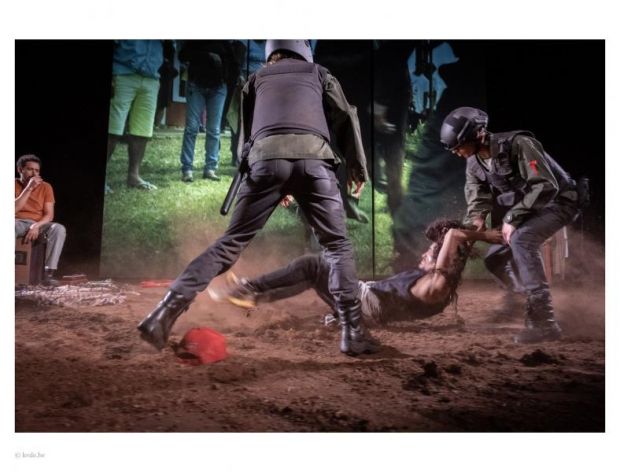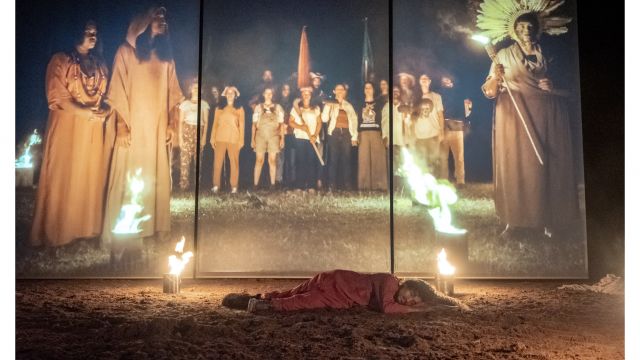Antigone in the Amazon
Every now and then a work comes along that simply defies the conventional. Milo Rau’s Antigone in the Amazon is one of these productions. After 1hr 50 minutes (with no interval) and the company receiving a much deserved and cheering standing ovation, I came out a little bewildered as to how will review this extraordinary work.
Researching this production, I discovered that it is one of three works by Swiss director Milo Rau and the Belgian company NTGent; the others being an adaptation of Aeschylus’ Orestia in Iraq and The New Gospel about the life of Jesus Christ using refugees in Matera, Italy. Antigone in the Amazon is the third in this trilogy by Milos Rau, who many regard as one of the world’s most important contemporary political directors. The focus of this work is the horrific injustice suffered by indigenous Brazilians in the face of government and corporate land grabbing, greed and cruelty. In 1996, 21 members of the Landless Workers Movement were massacred by a military police unit, and it is this incident that inspired Antigone in the Amazon.

The production begins with the ensemble of four actors establishing the context of their journey into the Brazilian Amazon, and a quote from Sophocles’ Antigone about the world being full of “monstrous” things, amongst them being “man” or mankind. Antigone is chosen because she represents resistance to fascism; but there are several forms in which Antigone appears. She is the mysterious Brazilian actress-activist, Kay Sara, who never really appears; she is also the organisation, the Landless Workers Movement. While Antigone’s rebellion against Creon’s dubious authority remains central to the dramatic narrative, nonetheless, the actors on-stage play other characters in the drama, such as Polynices, Creon, and Haemon. Gender is irrelevant; for instance, Creon is brilliantly played by Belgian actress Sara De Bosschere, while Brazilian actor, Frederico Araujo is superb as Polynices as well as other roles. One of the most effective sequences involves Eurydice (played on-screen by Brazilian actress Celia Maracaja) dealing with the death of her son, Haemon. Truly majestic and profoundly moving.
The dramatic narrative swings from the Antigone story to the 1996 massacre, complemented by the swings from action on stage and video footage that the company took when filming in the Amazon. There is also a wonderful appearance by indigenous philosopher, Ailton Krenak, with the very sombre message that the Earth has an all-consuming fever and the best we can do is save what we love.

What is remarkable about this production is that it challenges conventional practice on so many levels. For instance, gender issues are in many ways irrelevant, stressed by the actors playing different roles; although the voice of protest is still predominately feminine. The re-invention and re-telling of the Antigone story also challenge convention, primarily by giving the focus to other characters in the play, such as Eurydice. There is also debated the very modern issue of what is “western civilisation”, as exemplified by Antigone and a European theatre company in the Amazon. At one point there is a speech, a rant about “western” privilege and guilt, which is firmly put in its place when the spokesperson for indigenous group says, “They don’t understand you anyway”. Despite this, however, the message is very clear; due to modern advancement and understanding, labels like “western civilisation” start to become meaningless as these days there is a massive world-wide fusion of cultures, and that the only solution is, to quote Auden, “We must love one another or die.”. You can agree or disagree with this notion, but what is undeniable is the bravery and commitment of Milo Rau and his ensemble who, like Antigone, dare to challenge fascistic authority, and in a world in which any deviation from an accepted and overwhelming norm, including gender, is met with death. Bravo!
5 Stars
Tony Knight
Photographer: Kurt van der Elst.
Click here to check out our other Adelaide Festival 2024 reviews.
Subscribe to our E-Newsletter, buy our latest print edition or find a Performing Arts book at Book Nook.

